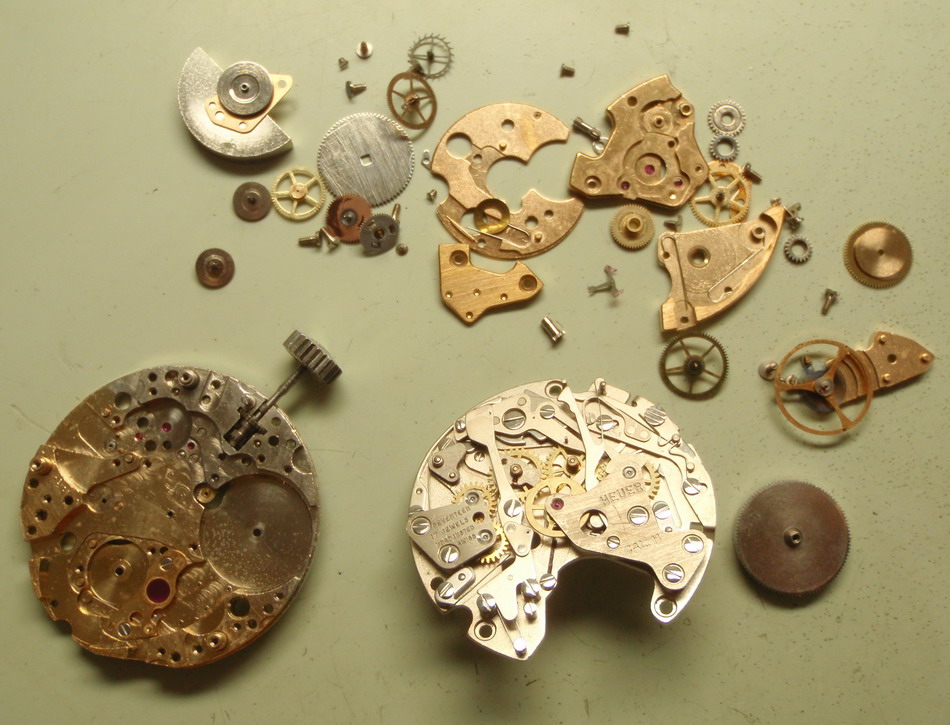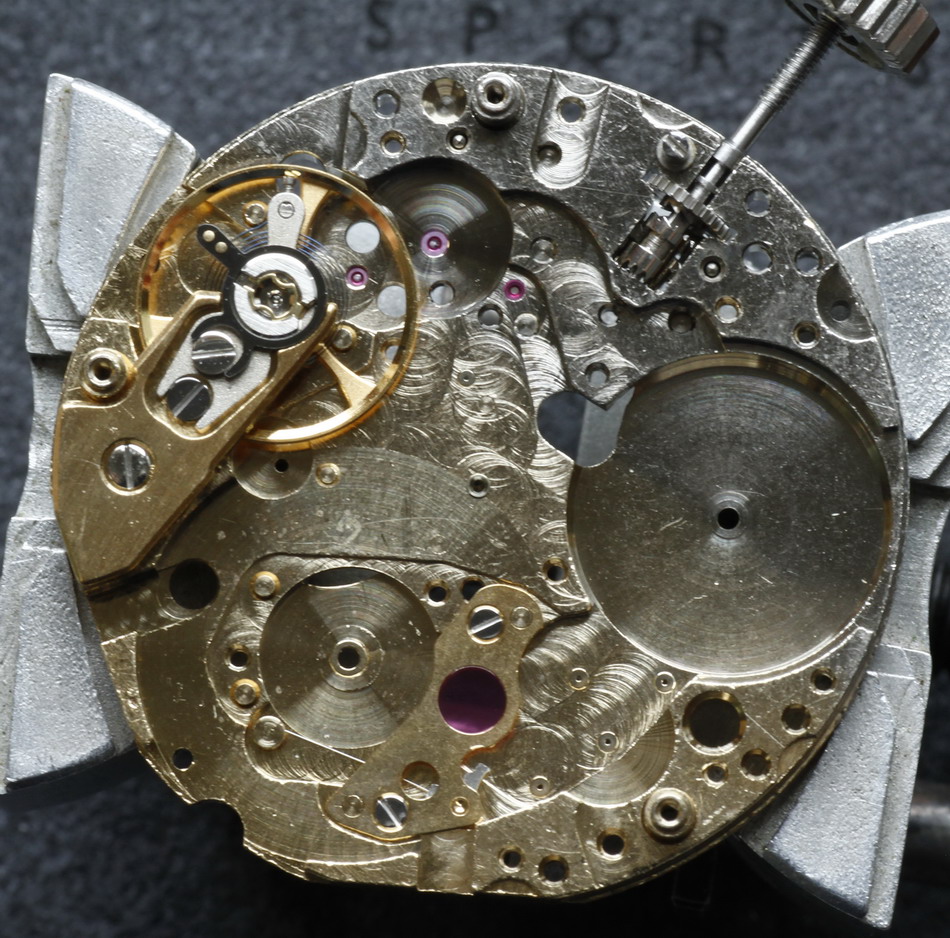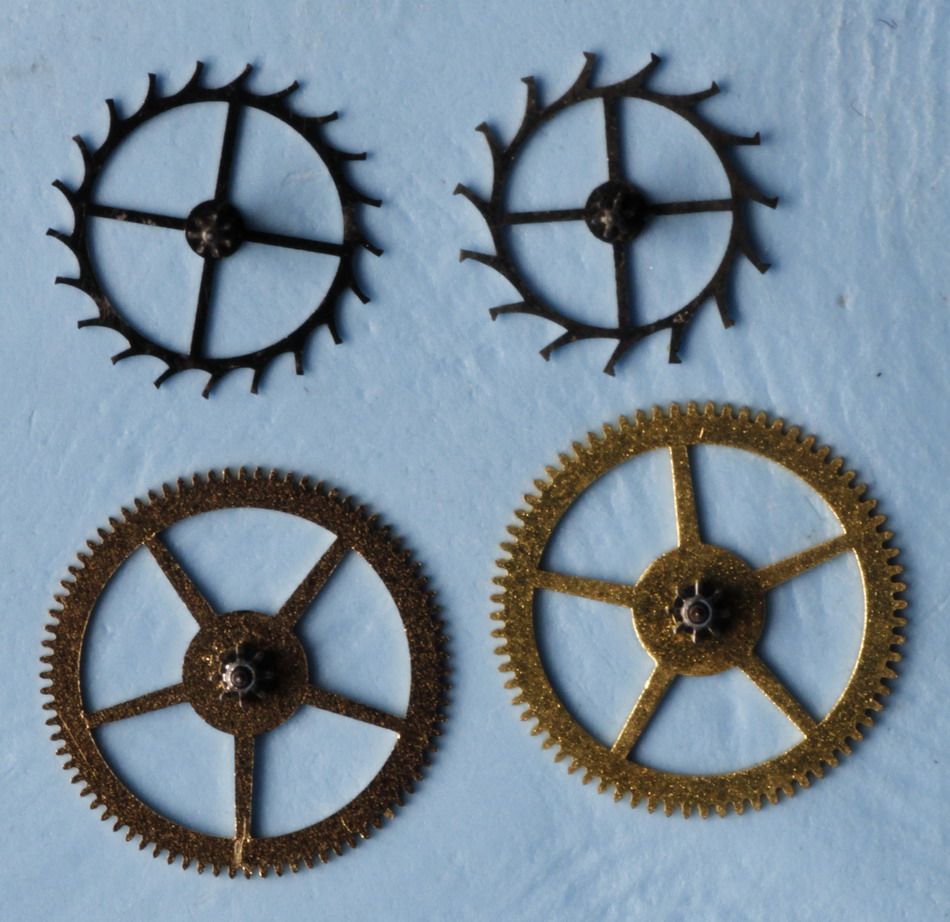With the listing for sale this morning of four Heuer chronographs powered by the 28,800 movements, it seems timely for me to assemble what I know about these movements into a posting. I have done some research into these movements, involving experts from the era when they were produced (say, circa 1970), current personnel at TAG Heuer and another collector who owns a watch powered by a 28800 movement. I had planned to conduct a lot more research, and then publish a comprehensive webpage on these movements . . . for better or worse, let me publish the information that I have assembled (as of July 8, 2011 . . . I suppose that completion of this project will be like finishing so many other projects in the queue . . . maybe it will happen / maybe it won’t.
I should add that I am writing this on an airplane, without any access to research materials or experts, so the following is based on what’s in my head at the moment (and on my hard-drive); yes, there are some informational gaps that I had hoped to fill, but we will roll the presses with what I have, and not worry about what I might have gathered with a few more hours of research. It is also unfortunate that I am unable to fully illustrate this posting with photos of the subject movements and chronographs; these can be added, at some later date.
So here is what I believe to be the situation regarding these 28800 movements:
- I understand that Heuer explored the use of high-beat 28800 vibrations per hour (VPH) movements, in the early period of the Caliber 11 (Chronomatic) movements. My best guess would be that Heuer was working on this project around 1969 / 1970. [This dating becomes important, when we begin to look at the cases in which some of these movements are now housed; about which more below.]
- Heuer arranged for Buren – one of the partners in the development of the Caliber 11 (Chronomatic) movements – to make prototypes of these movements. The use of Buren for this project makes perfect sense, as Buren had developed the base movements that would become the Caliber 11 / Caliber 12 series of movements.
- Modification of a standard Caliber 11 movement, with its beat of 19,800 VPH, to beat at 28,800 VPH was a relatively modest undertaking, requiring replacement of only a handful of components. Of course, it would take considerable engineering and design work, but compared with whet Buren and Heuer had been through to develop the Caliber 11 movement, I believe that it is fair to say that jumping up to 28,800 VPH was not an enormous undertaking. [Let’s also keep in mind that Heuer would switch from 19,800 VPH to 21,600 VPH, when it switched from the Caliber 11-I to the Caliber 12 movement.]
- At some point in the project, Heuer abandoned the idea of jumping the Caliber 11 movement up to the 28800 “high beat”. Perhaps Heuer decided that Zenith had the advantage in the “high beat” world, with the El Primero movement already beating at 36,000 VPH; perhaps there were technical issues with the prototypes. We don’t know the “why”, but we do know that Heuer abandoned its effort to produce chronographs powered by the 28,800 VPH version of the Caliber 11 movement.
- One of the mysteries here is exactly how many of the 28800 movements Buren produced for Heuer. I have heard that Buren produced 100 of the prototype movements; this number seems high to me, but this is just a gut reaction.
- To me, the biggest mystery of all is whether or not Heuer ever actually put any of these prototype 28800 movements into a case, to produce a working chronograph. Perhaps they produced a few prototype watches with these movements; perhaps none of the movements ever made it into a watch . . . this is a mystery that I have not been able to solve (as of July 8, 2011). My best guess – which I can explain when there is more time — is that Heuer assembled a very limited number of complete chronographs with the 28800 movements.
- I know of exactly 10 (ten) chronographs that currently incorporate the 28800 VPH movements; I own three of them; I know of another collector who owns one; we have seen four chronogrpahs offered for sale this morning . . . which brings the total to 8 (eight). There are two more, which I cannot write about at the moment. In terms of who produced these 10 chronographs and when they were produced, I believe that most of the 10 were produced by someone other than Heuer, in a timeframe well after the movements were produced by Buren. Whether they were assembled in 2010 or last week (or in 2000 or 1980) hardly matters; the key finding here is that most of the chronographs now housing the 28800 VPH movements were not produced in the period in which the movements were produced. Notice that I use the word “most”; I believe that a handful may have been made by or for Heuer, back in the day.
- I have had one of these 28800 VPH movements fully disassembled, inspected and overhauled (and photographed all along the way). The watchmaker who examined the watch confirmed that the movement appeared to have been produced in the period under consideration (say, around 1970); that all parts were from this same era; and that the quality and finish of all the parts in the 28800 VPH movement was consistent with parts that Heuer used in this period. He also confirmed that there were other clues in the movement that suggested that the movement was part of a prototyping project (the finish of certain plates; the placement of numbers on certain parts; etc.)



Jeff